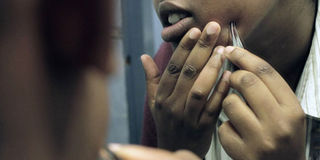Hair in the wrong places

Woman posing with tweezers against her face. PHOTO| EMMA NZIOKA
What you need to know:
Sarah’s mother-in-law claimed that Sarah’s chin hair meant that she was demon-possessed and that she would kill John.
The conflict between Sarah and her mother-in-law had dampened her desire for sex, while John was uncomfortable with being caught in the crossfire.
They wanted me to prescribe a cream that would get rid of the hair for good.
I noted that Sarah did not have a child and had never conceived. She was 32 and had been married for two years. She had not been on any contraceptive.
The hair growth on my chin is the cause of my tribulations,” Sarah told me at the clinic. She was accompanied by her husband John.
“I never used to have chin hair but in the last eight months it has become rather aggressive.”
Sarah’s mother-in-law claimed that Sarah’s chin hair meant that she was demon-possessed and that she would kill John.
The conflict between Sarah and her mother-in-law had dampened her desire for sex, while John was uncomfortable with being caught in the crossfire. They wanted me to prescribe a cream that would get rid of the hair for good.
I noted that Sarah did not have a child and had never conceived. She was 32 and had been married for two years. She had not been on any contraceptive.
“But that is not the issue, doctor,” Sarah explained, “It’s the hair -- I have used everything, but nothing seems to work; I fear I will soon be hairy all over.”
Genetic factors
The skin around her chin had become dark, like that of a man who shaves his beard often. She also had ugly pimples on her face which she attributed to her monthly periods which had increasingly become irregular.
Forty per cent of women have a few scattered and light-coloured hairs around the chin, maybe an isolated one on the cheek and sometimes on the chest. Some families may be more predisposed to this than others. Such hair may not cause concern because it is rarely visible.
What causes concern is sudden onset of too much and rather aggressive hair in places that only men have hair.
Excessive hair growth is called hirsutism and in a woman starts to follow a male pattern of hair growth, leading to the development of beard, moustache, chest hair, pubic hair growing upwards towards the navel and general increase of hair on the arms and legs.
Underlying problem
A woman who notices this hair in the wrong places should not take it lightly. The underlying problem may be high levels of male hormones (androgens) or hypersensitivity to androgens.
Other hormones e.g. insulin, cortisol and prolactin could be on the rise causing the problem.
Androgens also cause acne, may deepen the woman’s voice, and may cause scalp hair to fall off, leading to balding.
Together with the other hormones involved in the overall hormonal abnormality, they may interfere with sexual desire and function. There may be an effect on fertility too and the woman may fail to conceive.
Based on the affected hormones and resulting symptoms, a number of diseases conditions are coined which could be signalled by hirsutism.
The commonest of these is polycystic ovary disease which, in addition to hirsutism, is characterised by irregular periods, obesity and infertility. Ovaries of affected women have small multiple bags of fluid called cysts.
In the case where cortisol is the predominant hormonal problem, the disease is called Cushings Syndrome.
Other than causing hirsutism, people with this disease grow fat only in the trunk of the body, while their legs remain thin.
In some cases, hirsutism may be the first sign of a tumour in the ovary or adrenal glands. The growth produces hormones that disorganise the body and cause hirsutism.
Treatment
Medicines taken to treat other diseases sometimes cause hirsutism. Such medicine can mimic a hormone, causing its increased release.
After a number of tests, Sarah was found to have polycystic ovary disease. Treatment was directed at correcting the imbalance of hormones, which ultimately led to the disappearance of her hirsutism and acne.
She also eventually conceived.
“Mother in-laws are a godsend,” Sarah said jokingly when I last met her, “if it were not for her insisting that I was demon-possessed my condition would not have been detected and treated in good time.”





